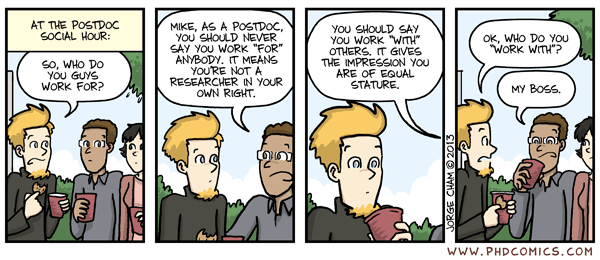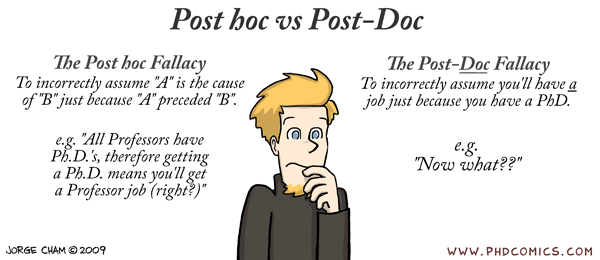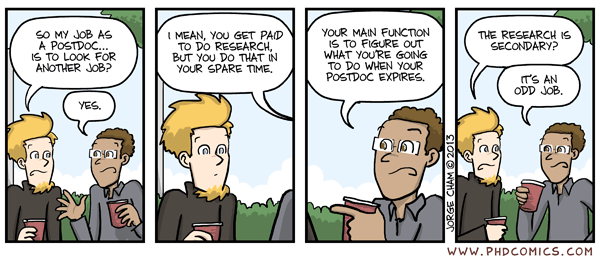This post is part 2 of a series with unsolicited advice for postdoc applicants. Part 1, which includes a description of the motivation behind the posts and tips 1 through 5, can be found here.
----
6. Promote yourself
This sounds sort of obvious, but for cultural reasons may come easier to some people than to others. I don't mean to suggest you should be boastful or oversell yourself in your CV and research statement. But be aware that people reading through hundreds of applications will not have time to read between the lines to discover your unstated accomplishments — so present the information that supports your application as clearly and as matter-of-factly as possible.
Organisers of seminar series and journal clubs are generally more than happy to have volunteers help fill some speaking slots — put anxieties to one side and just email them to ask! And if they do have time for you, make sure you give a good talk.
7. Know what type of postdoc you're applying for
There are, roughly speaking, three different categories of postdoc positions in high-energy and astro (and probably more generally in all fields of physics, if not in all sciences).
The first category is fellowships. These are positions which provide funding to the successful candidate to pursue a largely independent line of research. They therefore require you to propose a detailed and interesting research plan. They may sometimes be tied to a particular institution, but often they provide an external pot of money that you will be bringing to the department you go to. They are also highly prestigious. Examples applicable to a cosmology context are Hubble and Einstein fellowships in the US, CITA national fellowships in Canada, Royal Society and Royal Astronomical Society fellowships in the UK, Humboldt fellowships in Germany, Marie Skłodowska-Curie fellowships across Europe, and many others.
The second category is roughly a research assistant type of position. Here you are hired by some senior person who has won a grant for their research proposal, or has some other source of funding out of which to pay your salary. You are expected to work on their research project, in a pretty closely defined role.
The third category is a sort of mix of the above two, which I'll call a semi-independent postdoc. This is where the postdoc funding comes from someone's grant, but they do not specify a particular research programme at the outset, giving you a large degree of independence in what work you actually want to do.
 |
| Image credit: Jorge Cham. |
When you apply, it is imperative that you know which of these three types of positions the people hiring you have in mind. There is no point trying to sell a detailed independent research plan — no matter how exciting — to someone who is only interested in whether you have the specific skills and experience to do what they tell you to. Equally, if what they want is evidence that you will drive research in your own directions, an application that lists your technical skills but doesn't present a coherent plan of what you will do with them is no good.
Unfortunately postdoc ads don't use these terms, so it is generally not clear whether the position is of the second or third type. If in doubt, contact the department and find out what they want.
Also, even when the distinction may be clear, many people still produce the same type of application for all jobs they apply for in one cycle. I know of an instance of a highly successful young scientist who managed to win not one but two prestigious individual fellowship grants worth hundreds of thousands of Euros each, and yet did not get a single offer from any of non-fellowship positions they applied to! So tailor your applications to the situation.
8. Apply for fellowships
Applications for the more prestigious fellowships require more work — a lot more work — than other postdoc applications. They will require you to produce a proper research proposal, which will need to include a clear and inspiring outline — of anything between one and twenty pages length — of what you intend to do with the fellowship. This will take a long time to think of and longer to write. They will probably require you to work on the application in collaboration with your host department, and they may have a million other specifically-sized hoops for you to jump through.
Nevertheless, you should make a serious attempt to apply for them, for the following reasons.
Nevertheless, you should make a serious attempt to apply for them, for the following reasons.
- Any kind of successful academic career requires you to write lots of such proposals, so you might as well start practising now.
- Writing a proposal forces you to prepare a serious plan of what research you want to do over the next few years, which will help clarify a lot of things in your mind, including how much you actually want to stay in the field (see point 2 again!).
- You will often write the proposal in collaboration with your potential host department. This makes it far more likely that they will think favourably of you should any other opportunities arise there later! For instance, I know of many cases where applicants for Marie Curie fellowships have ended up with positions in the department of their choice even though the fellowship application itself was ultimately unsuccessful.
- Major fellowship programmes are more likely to have the resources and the procedures in place to thoroughly evaluate each proposal, reducing the unfortunate random element I'll talk about below. Many will provide individual feedback and assessments, which will help you if you reapply next year.
- Counter-intuitively, success rates may be significantly higher for major fellowships than for standard postdoc jobs! Last year, the success rate for Hubble fellowships was 5%, for Einstein fellowships 6%, and for Marie Curie fellowships (over all fields of physics) almost 18%. All of these numbers compare quite well with those for standard postdoc positions! Granted, this is at least partly due to self-selection by applicants who don't think they can prepare a good enough proposal in the first place, but it is still something to bear in mind.
- Obviously, a successful fellowship application counts for a lot more in advancing your career than a standard postdoc.
9. Recognize the randomness
Potential employers are faced with a very large number of applications for each postdoc vacancy; a ratio of 100:1 is not uncommon. Even with the best of intentions, it is just not possible to give each application equal careful consideration, so some basic pre-filtering is inevitable.
Unfortunately for you, each department will have its own criteria for pre-filtering, and you do not know what those criteria are. Some will filter on recommendation letters, some on number of publications, some on number of citations. (As a PhD student I was advised by a well-meaning faculty member at a leading UK university that although they found my research very interesting, I did not yet meet their cutoff of X citations for hiring postdocs.) Others may deduce your field of interest only from existing publications rather than your research statement — this is particularly hard on recent PhDs who may be trying to broaden their horizons beyond their advisor's influence.
Beyond this, it's doubtful that two people in different departments will have the same opinion of a given application anyway. They're only human, and their assessments will always be coloured by their own research interests, their plans for the future of the department, their different personal relationships with the writers of your recommendation letters, maybe even what they had for breakfast that morning.
You can't control any of this. Your job is to produce as good and complete an application as possible (remember to send everything they ask for!), to apply to lots of suitable places, and then to learn not to fret.
I'd also highly recommend reading this post by Renée Hlozek, which deals with many of the same issues. (Renée is one of the rising stars of cosmology, with a new faculty position after a very prestigious postdoc fellowship, but she too got multiple rejections the first time she applied. So it does happen to the best too, though people rarely tell you that.)
-------
That's it for my 10 tips on applying for (physics) postdocs. They were written primarily as advice I would have liked to have given my former self at the time I was completing my PhD.
There's plenty of other advice available elsewhere on the web, some of it good and some not so good. I personally felt that far too much of it concerned how to choose the best of multiple offers, which is both a bit pointless (if you've got so many offers you'll be fine either way) and really quite far removed from the experience of the vast majority of applicants. I hope some people find this a little more useful.
Unfortunately for you, each department will have its own criteria for pre-filtering, and you do not know what those criteria are. Some will filter on recommendation letters, some on number of publications, some on number of citations. (As a PhD student I was advised by a well-meaning faculty member at a leading UK university that although they found my research very interesting, I did not yet meet their cutoff of X citations for hiring postdocs.) Others may deduce your field of interest only from existing publications rather than your research statement — this is particularly hard on recent PhDs who may be trying to broaden their horizons beyond their advisor's influence.
Beyond this, it's doubtful that two people in different departments will have the same opinion of a given application anyway. They're only human, and their assessments will always be coloured by their own research interests, their plans for the future of the department, their different personal relationships with the writers of your recommendation letters, maybe even what they had for breakfast that morning.
You can't control any of this. Your job is to produce as good and complete an application as possible (remember to send everything they ask for!), to apply to lots of suitable places, and then to learn not to fret.
10. Don't tie your self-esteem to the outcome
You will get rejections. Many of them. Even worse, there will be many places who don't even bother to let you know you were rejected. You will sometimes get a rejection at the exact same time as someone else you know gets an offer, possibly for the same position. (Things are made worse if you read the postdoc rumour mills regularly.)
It's pretty hard to prevent these rejections from affecting you. It's all too easy to see them as a judgement of your scientific worth, or to develop a form of imposter syndrome. Don't do this! Read point 9 again.
I'd also highly recommend reading this post by Renée Hlozek, which deals with many of the same issues. (Renée is one of the rising stars of cosmology, with a new faculty position after a very prestigious postdoc fellowship, but she too got multiple rejections the first time she applied. So it does happen to the best too, though people rarely tell you that.)
-------
That's it for my 10 tips on applying for (physics) postdocs. They were written primarily as advice I would have liked to have given my former self at the time I was completing my PhD.
There's plenty of other advice available elsewhere on the web, some of it good and some not so good. I personally felt that far too much of it concerned how to choose the best of multiple offers, which is both a bit pointless (if you've got so many offers you'll be fine either way) and really quite far removed from the experience of the vast majority of applicants. I hope some people find this a little more useful.

